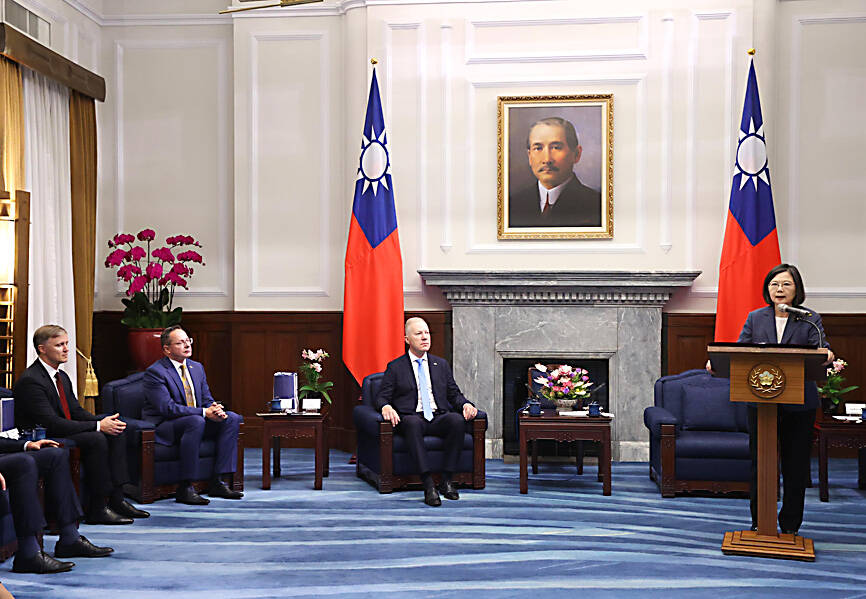President Tsai Ing-wen (蔡英文) yesterday urged three visiting Baltic foreign affairs committee heads to help facilitate Taiwan’s participation in their countries’ NATO Centres of Excellence (COE).
Tsai made the request at a meeting with Marko Mihkelson, chairman of the Estonian parliament’s foreign affairs committee, and his counterparts, Zygimantas Pavilionis of the Lithuanian Seimas and Rihards Kols of the Latvian Saeima, who are on a six-day visit to Taiwan.
The COEs are international military organizations that train and educate leaders and specialists from NATO member and partner countries, information on the alliance’s Web site says.

Photo: CNA
The president expressed hope that the delegation could help Taiwan participate in the Cooperative Cyber Defence Centre of Excellence in Estonia, the Strategic Communications Centre of Excellence in Latvia and the Energy Security Centre of Excellence in Lithuania.
Joining the COEs would deepen cooperation between Taiwan and the Baltic states on national defense, cybersecurity and all-out defense, Tsai said.
Thanking the Baltic nations for speaking up for Taiwan on many international occasions, including at the World Health Assembly in May, Tsai said that the visit is significant for regional security and bolstering international solidarity among democracies.
The Baltic nations’ spirit and actions in defending democratic beliefs, as exemplified by their vigorous support of Ukraine, “are truly admirable,” Tsai said.
The Taiwanese government and society donated nearly US$58 million and more than 700 tonnes of humanitarian aid to Ukraine, and will continue to work with the Baltic states and other countries to assist Ukraine’s recovery and reconstruction, she said.
Mihkelson said that the main purpose of the joint visit is to learn more about Taiwan and the “possibilities to enhance cooperation between our democratic societies.”
The trip is also a “show of solidarity at these turbulent times” against the aggression from neighboring authoritarian regimes, he said.
Taiwan has been recognized by the international society as a responsible partner for its contributions in tackling the COVID-19 pandemic and climate change, as well as for building a resilient society against authoritarian pressures, Mihkelson said.
The delegation, which is to leave Taiwan today, has learned during the trip that “there are numerous possibilities and new avenues we can strengthen cooperation between Baltic nations and Taiwan,” such as digitalization, cybersecurity, trade and economy, and science, he said.
The Baltic nations’ history of fighting for freedom and democracy against the Soviet Union taught them that “we should never be alone again,” he said, adding that the three countries have all built strong democratic societies and robust partnerships with allies to safeguard their hard-fought freedom.
Since February last year, the three countries have each spent more than 1 percent of their GDP to help Ukraine as they fight for shared freedom and a rules-based world order, he said.

‘TAIWAN-FRIENDLY’: The last time the Web site fact sheet removed the lines on the US not supporting Taiwanese independence was during the Biden administration in 2022 The US Department of State has removed a statement on its Web site that it does not support Taiwanese independence, among changes that the Taiwanese government praised yesterday as supporting Taiwan. The Taiwan-US relations fact sheet, produced by the department’s Bureau of East Asian and Pacific Affairs, previously stated that the US opposes “any unilateral changes to the status quo from either side; we do not support Taiwan independence; and we expect cross-strait differences to be resolved by peaceful means.” In the updated version published on Thursday, the line stating that the US does not support Taiwanese independence had been removed. The updated

‘CORRECT IDENTIFICATION’: Beginning in May, Taiwanese married to Japanese can register their home country as Taiwan in their spouse’s family record, ‘Nikkei Asia’ said The government yesterday thanked Japan for revising rules that would allow Taiwanese nationals married to Japanese citizens to list their home country as “Taiwan” in the official family record database. At present, Taiwanese have to select “China.” Minister of Foreign Affairs Lin Chia-lung (林佳龍) said the new rule, set to be implemented in May, would now “correctly” identify Taiwanese in Japan and help protect their rights, the Ministry of Foreign Affairs said in a statement. The statement was released after Nikkei Asia reported the new policy earlier yesterday. The name and nationality of a non-Japanese person marrying a Japanese national is added to the

AT RISK: The council reiterated that people should seriously consider the necessity of visiting China, after Beijing passed 22 guidelines to punish ‘die-hard’ separatists The Mainland Affairs Council (MAC) has since Jan. 1 last year received 65 petitions regarding Taiwanese who were interrogated or detained in China, MAC Minister Chiu Chui-cheng (邱垂正) said yesterday. Fifty-two either went missing or had their personal freedoms restricted, with some put in criminal detention, while 13 were interrogated and temporarily detained, he said in a radio interview. On June 21 last year, China announced 22 guidelines to punish “die-hard Taiwanese independence separatists,” allowing Chinese courts to try people in absentia. The guidelines are uncivilized and inhumane, allowing Beijing to seize assets and issue the death penalty, with no regard for potential

‘UNITED FRONT’ FRONTS: Barring contact with Huaqiao and Jinan universities is needed to stop China targeting Taiwanese students, the education minister said Taiwan has blacklisted two Chinese universities from conducting academic exchange programs in the nation after reports that the institutes are arms of Beijing’s United Front Work Department, Minister of Education Cheng Ying-yao (鄭英耀) said in an exclusive interview with the Chinese-language Liberty Times (the Taipei Times’ sister paper) published yesterday. China’s Huaqiao University in Xiamen and Quanzhou, as well as Jinan University in Guangzhou, which have 600 and 1,500 Taiwanese on their rolls respectively, are under direct control of the Chinese government’s political warfare branch, Cheng said, citing reports by national security officials. A comprehensive ban on Taiwanese institutions collaborating or